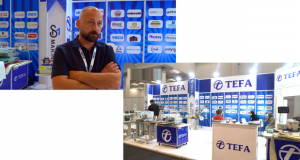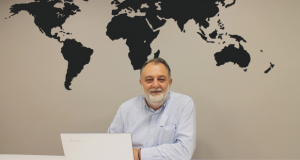Cotton Council International / Cotton Incorporated was established in 1956 with an aim to represent the USA cotton industry worldwide.
As a non-profit organization this partnership supplies cotton fiber for textile manufacturers. With this idea the Cotton USA program reaches over 3 billion people in more than 50 countries where the clients of American cotton operate. Having offices in many countries including London, Seoul, Shanghai and Hong Kong, CCI is represented successfully in Turkey since 1990. Turkey Program Director Marsha Powell outlined their operations for the Sleep Tech readers:
Would you introduce yourself briefly?
Cotton Council International and Cotton Incorporated are the non-profit trade associations that represent the US cotton industry worldwide. Their mission is to develop the trade for cotton and US cotton through education, networking and technical innovation.
What are the milestones of Cotton Council International since 1956?
The objectives of Cotton Council International have evolved since it started in 1956 as the world market changed. As long ago as 1970 the majority of US cotton was used by the US cotton mills and only 38%of US cotton was exported. As labor costs rose and the US industry became less competitive, the US spinning industry consolidated, and more and more US cotton was exported. Today about 80% of US cotton is exported so CCI’s mission – to develop and support US cotton customers around the world has become more important to the US industry. Of course Turkey is a high priority market as Turkey is the 2nd largest market for US cotton, after China. Another key development since the 1950s is the growth of polyester and other manmade fibers. That means more competition if cotton and US cotton. In 1989 CCI launched the COTTON USA Mark and began promoting cotton to consumers in overseas markets. The growth of US exports is a strong testimony to the success of CCI’s mission. In more recent years, CCI has worked to strengthen the supply chain from mills, the fabric manufacturers to garment and home textile sector to consumers through brands and retailers. CCI’s licensing program for the COTTON USA Mark and the Supply Chain Marketing Program helps our spinning customers and fabric manufacturers develop new customer relations in new markets faster and more efficiently. Over recent years CCI has recorded over $50 million in new business for the users of US cotton.
Since what date Cotton USA is active in Turkey?
CCI has been active in Turkey since 1990. At that time, Turkey bought about 50,000 bales of US cotton/year as the Turkish crop at that time was larger than the capacity of th textile industry. Regardless of the availability of local Turkish cotton, some mills preferred the fiber properties of US cotton, so some US cotton was imported. However, the textile industry grew quickly and the demand for cotton quickly became larger than the availability of local cotton. In addition, as mills began to understand the advantages, many still opted for US cotton as it performed better in the mill. Over the years, imports in general grew and imports of US cotton increased to today’s position. Of course statistics vary from year to year but in general terms Turkey grows a little less than 50% of it cotton needs and imports a little more than 50% of it cotton needs. Of the cotton imported, about 50% is usually US cotton – around 2 million bales.
What advantages and services Cotton USA offers for the Turkish mattress industry?
The advantages of US cotton are many, including: even running bales which make US cotton perform more efficiently in the spinning section; the ability to know all fiber characteristics before you buy throughout the HVI (High Volume Instrumentation) system in which every bale of US cotton is classed by computers; year around availability; a reliable and transparent supply chain; and, through CCI networking support to find new customers and open new markets.
What is Turkey’s case in the global cotton market?
Turkey remains a clear leader in the world of cotton, textiles, garment manufacturing and home textiles. As a producer of cotton fiber, Turkey ranks 8th in the world. Turkey’s textile industry ranks 9th globally while its garment manufacturing is 5th largest. The textile, garment and home textile set or remains an important contributor to Turkey’s economy, contributing $19 billion in exports alone. Of this about 10% is home textiles. Given Turkey’s dominant as the European supplier – we believe Turkey’s textile industry will remain important and strong.
Cotton usage in mattress ticking fabrics increased in recent years. What caused to this change?
We see consumers around the world increasingly aware of their environment and natural products. Naturally if we spend one third of our lives in bed – sleeping on a natural product is an important part of a natural lifestyle. Of all the natural fibers – cotton is the most abundant so it is the natural choice. After all, cotton provide breathability, is cool in summer and warm in winter. I can think of no better choice to sleep on but cotton.
What are the problems generally faced in the mattress ticking fabrics and readymade clothing made from cotton and what solutions does Cotton Council International offer to overcome these problems?
Some marketing efforts behind man-made fibers emphasize their performance abilities. Through the research activities of CCI’s sister company Cotton Incorporated, the US industry is developing ways that give cotton high performance qualities as well. For example, clothing that can control the moisture retained on the interior of the fabric can be more comfortable for some athletes or in hot climate. There are treatments that can be used on cotton so it too has moisture management plus its natural origin. CCI and Cotton Incorporated work with the industry in Turkey and around the world to keep cotton the preferred fiber for all uses.
 SleepTech Magazine Mattress, Accessories, Machinery, Raw Materials
SleepTech Magazine Mattress, Accessories, Machinery, Raw Materials


